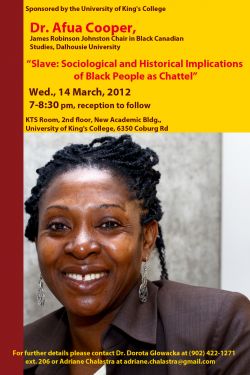Halifax Media Co-op
News from Nova Scotia's Grassroots
Halifax, Nova Scotia
Slave: Sociological and Historical Implications of Black People as Chattel

7:00pm
- 8:30pm
Wednesday March 14 2012
» More information
-
By Dr. Afua Cooper
James Robinson Johnston Chair in Black Canadian Studies
Dalhousie University
Sponsored by the University of King's CollegeReception to follow
This talk will examine the approximate 2000 Black children, women, and men who were transported by the Royal Navy from the Chesapeake region of the United States to Nova Scotia, British North America after the War of 1812. Like the Loyalists before them, the British had promised these Refugees, as they came to be called, freedom, land, food, tools, and other resources necessary to start a new life in their new country of residence. The promises made to the Refugees were rarely fulfilled. In fact, in Nova Scotia their presence was resented by the colonial government and local community so much so that the then Lieutenant-Governor Lord Dalhousie proposed to return them to their former masters in the United States, or ship them to Sierra Leone or Trinidad. Dalhousie was one in a long line of Canadian officials in whose imagination Blacks were cast as perpetual slaves. The question to ask is why, even in freedom, were Blacks viewed as slaves, in need of a proprietor or supervisor. To answer this question, I look at Black people’s experience in enslavement over the course of three centuries in North America, Canada in particular. I will articulate that for Black Canadians to have racial justice and complete citizenship, this embedded notion of Blacks as property must be abolished.
Dr. Afua Cooper is the current James Robinson Johnston Chair. She holds a Ph.D. in Black Canadian Studies from the University of Toronto. Her expertise includes African Canadian culture, the African Diaspora, gender, slavery, abolition, and freedom, community formation, education, Black Literatures and Dub Poetry, and Black agency and political consciousness. She has conducted research on Canadian Black life and culture in the provinces on Nova Scotia, Ontario, British Columbia, and Quebec. Her research on African Diaspora has taken her to Senegal, Gambia, Guinea, the United States, the United Kingdom, Jamaica, Cuba, St. Maarten, Trinidad and Guadeloupe . Her co-authored publication We’re Rooted Here and they Can’t Pull Us Up: Essays in African Canadian Women’s History won the Joseph Brant prize for the best history book. Her ground-breaking book on Canadian slavery, The Hanging of Angelique: The Untold Story of Slavery in Canada and the Burning of Old Montreal was nominated for the Governor General’s award. Dr. Cooper has curated exhibits on African Canadian history and culture, and the transatlantic slave trade for all three levels of governments. She is the recipient of the Harry Jerome Award for Professional excellence, and the Planet Africa Renaissance Award.
Afua is also an accomplished poet and novelist. She has published five books of poetry, including the critically acclaimed Copper Woman and Other Poems, and two historical novels. Her work in the creative arts has been recognized with the Premier of Ontario Award for Excellence in the Arts, and the Red Maple Fiction Award.
The site for the Halifax local of The Media Co-op has been archived and will no longer be updated. Please visit the main Media Co-op website to learn more about the organization.


